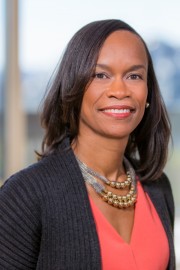
As part of my research on black women in public policy during my senior year of college, it was only fitting to interview Dr. Valerie Rawlston Wilson of the Economic Policy Institute (EPI). Dr. Wilson is an economist and Director of the Economic Policy Institute’s Program on Race, Ethnicity, and the Economy (PREE). EPI focuses on economic research and policy analysis; their mission is to inform and empower others to know more about the economy to find solutions and ways to increase their economic mobility. PREE, which celebrates its tenth anniversary this year, focuses on the economic circumstances of people of color. Dr. Wilson’s latest work includes research with Jessica Schieder that argues that the War on Poverty failed. To wit, there are more people in the U.S. in poverty than 50 years ago; children of color are especially affected. I spent an hour talking to her on Skype for my study, and then followed up with a few focused questions, shared here, about her career path in policy work while defying stereotypes of black women.
EO: As director of PREE at EPI, what does your job consist of?
VW: As director of PREE at EPI, I serve as our resident expert on issues pertaining to racial justice and economic inequality. What that means in layman’s terms is that I do research, write, and speak about racial and ethnic disparities in unemployment, wages, income, poverty and wealth. I also engage with other organizations and the media around these issues.
EO: As a black woman in policy with a PhD, what were some of your biggest challenges getting to where you are today?
VW: My biggest challenge was winning the mental game that comes with getting a PhD, which feels like a process where you’re constantly having to prove yourself. There’s an interesting mental and emotional balancing act that goes on between having the confidence to say, “I am capable of doing this. Of course, I deserve to be here,” particularly in a field where there are very few black women, and being humble enough to admit when you don’t know something so that you can get what you need to finish. Another big part of getting through a PhD program is persistence – being able to push through the many difficult, tedious, often solitary tasks while coping with disappointments and detours along the way. I was able to earn a PhD not because I zoomed through the program without any problems. I finished because I didn’t quit.
EO: What influenced your passion and decision to focus your research life around topics like economic inequality, wealth, and income?
VW: Growing up as a black person in America, it’s impossible to miss the racial divide between those who have wealth and power and those who don’t. I was blessed to grow up in a middle-class family with two parents who were working professionals, and to live in a neighborhood with other black, professional middle class families. We were not wealthy by any means, but at the same time, I was aware that my life wasn’t necessarily the norm for all black people. I was also an excellent student, and a very analytical thinker. When I discovered that economics was a way I could use my intellectual curiosity to say something meaningful about how race affects social and economic outcomes, it seemed like a perfect match.
…
EO: Often times many black women feel the need to prove that they are capable and deserving. This is because of the fear that others won’t take them seriously or see their voices as valuable. Through our conversations and reading her work, Dr. Wilson helped me realize that if I work hard enough to stay persistent, informed, and aware, I do not have to prove anything to anyone; my work will speak for me. My voice and my abilities are just as important as everyone in the room that doesn’t look like me. It is easy to just assume that being a person of color, I can’t get as far as I want to in my career goals. But having people such as Dr. Wilson to prove otherwise makes a difference in not only my life but for every black girl and woman who doesn’t feel as though they are enough.
Eunice Owusu is a Council on Contemporary Families Public Affairs Intern and a 2018 graduate of Framingham State University in Sociology with a minor in Political Science. Dr. Wilson’s full bio is here, and you can follow her at @ValerieRWilson.


Comments